- Home
- Robert Harris
The Fear Index
The Fear Index Read online
Contents
About the Book
About the Author
Also by Robert Harris
Title Page
Dedication
Acknowledgements
Chapter 1
Chapter 2
Chapter 3
Chapter 4
Chapter 5
Chapter 6
Chapter 7
Chapter 8
Chapter 9
Chapter 10
Chapter 11
Chapter 12
Chapter 13
Chapter 14
Chapter 15
Chapter 16
Chapter 17
Chapter 18
Chapter 19
Copyright
About the Book
His name is carefully guarded from the general public but within the secretive inner circles of the ultra-rich Dr Alex Hoffmann is a legend – a visionary scientist whose computer software turns everything it touches into gold.
Together with his partner, an investment banker, Hoffmann has developed a revolutionary form of artificial intelligence that tracks human emotions, enabling it to predict movements in the financial markets with uncanny accuracy. His hedge fund, based in Geneva, makes billions.
But then in the early hours of the morning, while he lies asleep with his wife, a sinister intruder breaches the elaborate security of their lakeside house. So begins a waking nightmare of paranoia and violence as Hoffmann attempts, with increasing desperation, to discover who is trying to destroy him.
His quest forces him to confront the deepest questions of what it is to be human. By the time night falls over Geneva, the financial markets will be in turmoil and Hoffmann’s world – and ours – transformed forever.
About the Author
Robert Harris has written seven previous novels – Fatherland, Enigma, Archangel, Pompeii, Imperium, The Ghost and Lustrum. His work has been translated into thirty-seven languages. For his collaboration with Roman Polanski on the film version of The Ghost, he won both the French César and the European Film Award for best adapted screenplay.
A graduate of Cambridge University, where he studied English, he joined the BBC and later wrote for the Observer, the Sunday Times and the Daily Telegraph. He is a Fellow of the Royal Society of Literature.
He is married to Gill Hornby. They have four children and live in a village near Hungerford in West Berkshire.
Also by Robert Harris
FICTION
Fatherland
Enigma
Archangel
Pompeii
Imperium
The Ghost
Lustrum
NON-FICTION
A Higher Form of Killing (with Jeremy Paxman)
Gotcha!
The Making of Neil Kinnock
Selling Hitler
Good and Faithful Servant
To my family
Gill,
Holly, Charlie, Matilda, Sam
Acknowledgements
I WISH TO thank all those whose expertise, generously given, has made this book possible: first and foremost Neville Quie of Citi, who made many helpful suggestions and introductions and who, along with Cameron Small, patiently helped me through the labyrinth of shorts and out-of-the-money puts; Charles Scott, formerly of Morgan Stanley, who discussed the concept, read the manuscript and introduced me to Andre Stern of Oxford Asset Management, Eli Lederman, former CEO of Turquoise, and David Keetly and John Mansell of Polar Capital Alva Fund, all of whom provided useful insights; Leda Braga, Mike Platt, Pawel Lewicki and the algorithmic team at BlueCrest for their hospitality and for letting me spend a day watching them in action; Christian Holzer for his advice on the VIX; Lucie Chaumeton for fact-checking; Philippe Jabre of Jabre Capital Partners SA for sharing his knowledge of the financial markets; Dr Ian Bird, head of the Large Hadron Collider Computing Grid Project, for two conducted tours and insights into CERN in the 1990s; Ariane Koek, James Gillies, Christine Sutton and Barbara Warmbein of the CERN Press Office; Dr Bryan Lynn, an academic physicist who worked at both Merrill Lynch and CERN and who kindly described his experiences of moving between these different worlds; Jean-Philippe Brandt of the Geneva Police Department for giving me a tour of the city and answering my queries about police procedure; Dr Stephen Golding, Consultant Radiologist at the John Radcliffe Hospital in Oxford, for advising me on brain scans and putting me in touch with Professor Christoph Becker and Dr Minerva Becker who in turn helpfully arranged a tour of the Radiological Department of the University Hospital in Geneva. None of these, of course, is responsible for the errors of fact, misguided opinions and Gothic flights of fantasy that follow.
Finally a special word of thanks to Angela Palmer, who selflessly allowed me to borrow the concept of her stunning art works and bestow them on Gabrielle Hoffmann (the originals can be seen at angelaspalmer.com), and also to Paul Greengrass, for wise advice, good friendship and the sharing of numerous Liquidity Replenishment Points along the way.
Robert Harris
11.7.11
1
Learn from me, if not by my precepts, at least by my example, how dangerous is the acquirement of knowledge, and how much happier that man is who believes his native town to be the world, than he who aspires to become greater than his nature will allow.
MARY SHELLEY, Frankenstein (1818)
DR ALEXANDER HOFFMANN SAT BY the fire in his study in Geneva, a half-smoked cigar lying cold in the ashtray beside him, an anglepoise lamp pulled low over his shoulder, turning the pages of a first edition of The Expression of the Emotions in Man and Animals by Charles Darwin. The Victorian grandfather clock in the hall was striking midnight but Hoffmann did not hear it. Nor did he notice that the fire was almost out. All his formidable powers of attention were directed on to his book.
He knew it had been published in London in 1872 by John Murray & Co. in an edition of seven thousand copies, printed in two runs. He knew also that the second run had introduced a misprint – ‘htat’ – on page 208. As the volume in his hands contained no such error, he presumed it must have come from the first run, thus greatly increasing its value. He turned it round and inspected the spine. The binding was in the original green cloth with gilt lettering, the spine-ends only slightly frayed. It was what was known in the book trade as ‘a fine copy’, worth perhaps $15,000. He had found it waiting for him when he returned home from his office that evening, as soon as the New York markets had closed, a little after ten o’clock. Yet the strange thing was, even though he collected scientific first editions and had browsed the book online and had in fact been meaning to buy it, he had not actually ordered it.
His immediate thought had been that it must have come from his wife, but she had denied it. He had refused to believe her at first, following her around the kitchen as she set the table, holding out the book for her inspection.
‘You’re really telling me you didn’t buy it for me?’
‘Yes, Alex. Sorry. It wasn’t me. What can I say? Perhaps you have a secret admirer.’
‘You are totally sure about this? It’s not our anniversary or anything? I haven’t forgotten to give you something?’
‘For God’s sake, I didn’t buy it, okay?’
It had come with no message apart from a Dutch bookseller’s slip: ‘Rosengaarden & Nijenhuise, Antiquarian Scientific & Medical Books. Established 1911. Prinsengracht 227, 1016 HN Amsterdam, The Netherlands.’ Hoffmann had pressed the pedal on the waste bin and retrieved the bubble wrap and thick brown paper. The parcel was correctly addressed, with a printed label: ‘Dr Alexander Hoffmann, Villa Clairmont, 79 Chemin de Ruth, 1223 Cologny, Geneva, Switzerland.’ It had been dispatched by courier from Amsterdam the previous day.
After they had eaten thei
r supper – a fish pie and green salad prepared by the housekeeper before she went home – Gabrielle had stayed in the kitchen to make a few anxious last-minute phone calls about her exhibition the next day, while Hoffmann had retreated to his study clutching the mysterious book. An hour later, when she put her head round the door to tell him she was going up to bed, he was still reading.
She said, ‘Try not to be too late, darling. I’ll wait up for you.’
He did not reply. She paused in the doorway and considered him for a moment. He still looked young for forty-two, and had always been more handsome than he realised – a quality she found attractive in a man as well as rare. It was not that he was modest, she had come to realise. On the contrary: he was supremely indifferent to anything that did not engage him intellectually, a trait that had earned him a reputation among her friends for being downright bloody rude – and she quite liked that as well. His preternaturally boyish American face was bent over the book, his spectacles pushed up and resting on the top of his thick head of light brown hair; catching the firelight, the lenses seemed to flash a warning look back at her. She knew better than to try to interrupt him. She sighed and went upstairs.
Hoffmann had known for years that The Expression of the Emotions in Man and Animals was one of the first books to be published with photographs, but he had never actually seen them before. Monochrome plates depicted Victorian artists’ models and inmates of the Surrey Lunatic Asylum in various states of emotion – grief, despair, joy, defiance, terror – for this was meant to be a study of Homo sapiens as animal, with an animal’s instinctive responses, stripped of the mask of social graces. Born far enough into the age of science to be photographed, their misaligned eyes and skewed teeth nonetheless gave them the look of crafty, superstitious peasants from the Middle Ages. They reminded Hoffmann of a childish nightmare – of grown-ups from an old-fashioned book of fairy tales who might come and steal you from your bed in the night and carry you off into the woods.
And there was another thing that unsettled him. The bookseller’s slip had been inserted into the pages devoted to the emotion of fear, as if the sender specifically intended to draw them to his attention:
The frightened man at first stands like a statue motionless or breathless, or crouches down as if instinctively to escape observation. The heart beats quickly and violently, so that it palpitates or knocks against the ribs …
Hoffmann had a habit when he was thinking of cocking his head to one side and gazing into the middle distance, and he did so now. Was this a coincidence? Yes, he reasoned, it must be. On the other hand, the physiological effects of fear were so directly relevant to VIXAL-4, the project he was presently involved in, that it did strike him as peculiarly pointed. And yet VIXAL-4 was highly secret, known only to his research team, and although he took care to pay them well – $250,000 was the starting salary, with much more on offer in bonuses – it was surely unlikely any of them would have spent $15,000 on an anonymous gift. One person who certainly could afford it, who knew all about the project and who would have seen the joke of it – if that was what this was: an expensive joke – was his business partner, Hugo Quarry, and Hoffmann, without even thinking about the hour, rang him.
‘Hello, Alex. How’s it going?’ If Quarry saw anything strange in being disturbed just after midnight, his perfect manners would never have permitted him to show it. Besides, he was accustomed to the ways of Hoffmann, ‘the mad professor’, as he called him – and called him it to his face as well as behind his back, it being part of his charm always to speak to everyone in the same way, public or private.
Hoffmann, still reading the description of fear, said distractedly, ‘Oh, hi. Did you just buy me a book?’
‘I don’t think so, old friend. Why? Was I supposed to?’
‘Someone’s just sent me a Darwin first edition and I don’t know who.’
‘Sounds pretty valuable.’
‘It is. I thought, because you know how important Darwin is to VIXAL, it might be you.’
‘’Fraid not. Could it be a client? A thank-you gift and they’ve forgotten to include a card? Lord knows, Alex, we’ve made them enough money.’
‘Yeah, well. Maybe. Okay. Sorry to bother you.’
‘Don’t worry. See you in the morning. Big day tomorrow. In fact, it’s already tomorrow. You ought to be in bed by now.’
‘Sure. On my way. Night.’
As fear rises to an extreme pitch, the dreadful scream of terror is heard. Great beads of sweat stand on the skin. All the muscles of the body are relaxed. Utter prostration soon follows, and the mental powers fail. The intestines are affected. The sphincter muscles cease to act, and no longer retain the contents of the body …
Hoffmann held the volume to his nose and inhaled. A compound of leather and library dust and cigar smoke, so sharp he could taste it, with a faint hint of something chemical – formaldehyde, perhaps, or coal-gas. It put him in mind of a nineteenth-century laboratory or lecture theatre, and for an instant he saw Bunsen burners on wooden benches, flasks of acid and the skeleton of an ape. He reinserted the bookseller’s slip to mark the page and carefully closed the book. Then he carried it over to the shelves and with two fingers gently made room for it between a first edition of On the Origin of Species, which he had bought at auction at Sotheby’s in New York for $125,000, and a leather-bound copy of The Descent of Man that had once belonged to T. H. Huxley.
Later, he would try to remember the exact sequence of what he did next. He consulted the Bloomberg terminal on his desk for the final prices in the USA: the Dow Jones, the S&P 500 and the NASDAQ had all ended down. He had an email exchange with Susumu Takahashi, the duty dealer in charge of execution on VIXAL-4 overnight, who reported that everything was functioning smoothly, and reminded him that the Tokyo Stock Exchange would reopen in less than two hours’ time following the annual three-day Golden Week holiday. It would certainly open down, to catch up with what had been a week of falling prices in Europe and the US. And there was one other thing: VIXAL was proposing to short another three million shares in Procter & Gamble at $62 a share, which would bring their overall position up to six million – a big trade: would Hoffmann approve it? Hoffmann emailed ‘OK’, threw away his unfinished cigar, put a fine-meshed metal guard in front of the fireplace and switched off the study lights. In the hall he checked to see that the front door was locked and then set the burglar alarm with its four-digit code: 1729. (The numerals came from an exchange between the mathematicians G. H. Hardy and S. I. Ramanujan in 1920, when Hardy went in a taxi cab with that number to visit his dying colleague in hospital and complained it was ‘a rather dull number’, to which Ramanujan responded: ‘No, Hardy! No, Hardy! It is a very interesting number. It is the smallest number expressible as the sum of two cubes in two different ways.’) He left just one lamp lit downstairs – of that he was sure – then climbed the curved white marble staircase to the bathroom. He took off his spectacles, undressed, washed, brushed his teeth and put on a pair of blue silk pyjamas. He set the alarm on his mobile for six thirty, registering as he did so that the time was then twenty past twelve.
In the bedroom he was surprised to find Gabrielle still awake, lying on her back on the counterpane in a black silk kimono. A scented candle flickered on the dressing table; otherwise the room was in darkness. Her hands were clasped behind her head, her elbows sharply pointed away from her, her legs crossed at the knee. One slim white foot, the toenails painted dark red, was making impatient circles in the fragrant air.
‘Oh God,’ he said. ‘I’d forgotten the date.’
‘Don’t worry.’ She untied her belt and parted the silk, then held out her arms to him. ‘I never forget it.’
IT MUST HAVE been about three fifty in the morning that something caused Hoffmann to wake. He struggled up from the depths of sleep and opened his eyes to behold a celestial vision of fiery white light. It was geometrically formed, like a graph, with thinly spaced horizontal lines and wide-apart vertical colu
mns, but with no data plotted – a mathematician’s dream, but not in fact a dream, he realised after squinting at it for a few seconds; rather the result of eight five-hundred-watt tungsten-halogen security lights shining brilliantly through the slats of the window blinds – enough wattage to light a small soccer ground; he had been meaning to have them changed.
The lights were on a thirty-second timer. As he waited for them to turn off, he considered what might have interrupted the infrared beams that criss-crossed the garden to trigger them. It would be a cat, he thought, or a fox, or a piece of overgrown foliage waving in the wind. And after a few seconds the lights were indeed doused and the room returned to darkness.
But now Hoffmann was wide awake. He reached for his mobile. It was one of a batch specially produced for the hedge fund that could encrypt certain sensitive phone calls and emails. To avoid disturbing Gabrielle – she detested this habit of his even more than she hated him smoking – he switched it on under the duvet and briefly checked the Profit & Loss screen for Far Eastern trading. In Tokyo, Singapore and Sydney the markets were, as predicted, falling but VIXAL-4 was already up 0.3 per cent, which meant by his calculations that he had made almost $3 million since going to bed. Satisfied, he turned off the device and replaced it on the nightstand, and that was when he heard a noise: soft, unidentifiable, and yet oddly disturbing, as if someone was moving around downstairs.
Staring at the tiny red dot of light of the smoke detector fixed to the ceiling, he extended his hand cautiously beneath the duvet towards Gabrielle. Lately, after they had made love, if she couldn’t sleep, she had got into the habit of going down to her studio to work. His palm traversed the warm undulations of the mattress until his fingertips brushed the skin of her hip. Immediately she muttered something unintelligible and rolled her back to him, pulling the duvet tighter around her shoulders.

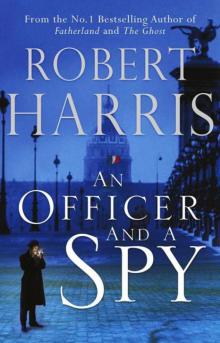 An Officer and a Spy
An Officer and a Spy Dictator
Dictator Imperium:
Imperium: Enigma
Enigma Fatherland
Fatherland Dictator:
Dictator: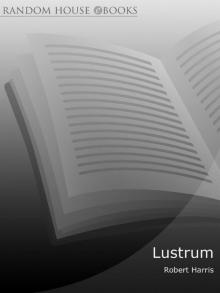 Lustrum
Lustrum Archangel
Archangel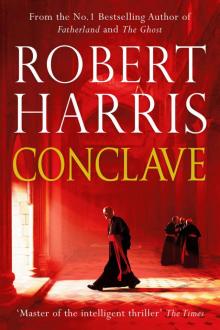 Conclave
Conclave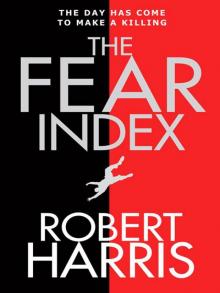 The Fear Index
The Fear Index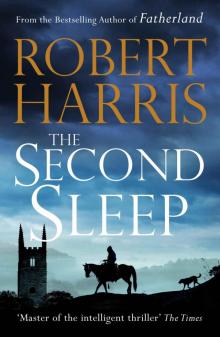 The Second Sleep
The Second Sleep V2
V2 Lustrum c-2
Lustrum c-2 Imperium
Imperium The Dictator
The Dictator Selling Hitler
Selling Hitler Archangel (Mass Market Paperback)
Archangel (Mass Market Paperback)